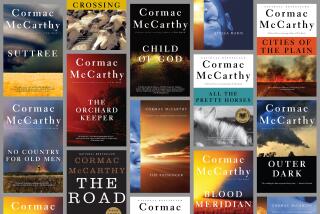Blast, We Forgot the Sisters Karamazov : Kingsley Amis can skewer the modern world like no other writer : THE RUSSIAN GIRL, <i> By Kingsley Amis (Viking: $22.95; 296 pp.)</i>
Sir Kingsley Amis’ 21st novel opens ominously: The London Institute for Slavonic Studies is under assault on two fronts. Women faculty members are boycotting staff meetings to protest the Old Guard, Old Boy ways of the institute. Meanwhile, ineluctable and complex social and economic trends dictate that soon none of the school’s students will be required to be fluent in--or even vaguely familiar with--Slavic languages. Better to have read “The Brothers Karamazov” in translation than never to have read it at all, as one character remarks, seeking to win over a hidebound traditionalist to the inevitable dumbing down of the institute.
Not surprisingly, the recalcitrant stick-in-the-mud is Amis’ hero, or what passes for one in the author’s hilariously cruel universe. Having deftly assembled the forces of darkness, Amis promptly shoves Dr. Richard Vaisey down the gauntlet of fate. After not all that many pages, the 46-year-old Russian literature expert is receiving a brutal psychological caning because his sense of honor and his hormones are in conflict.
Vaisey’s midlife crisis stems from his multicultural adultery with Anna Danilova, a young Russian poet whose brother has been imprisoned for a vast financial fraud during the waning days of the Soviet state. Vaisey meets and falls for Anna when she comes to London to initiate a publicity drive to free her brother.
Two problems soon snare Vaisey. First, the brother is guilty of the swindle and, therefore, hardly the advertised prisoner of conscience. Second, while Vaisey loves Anna, he almost instinctively loathes her poetry. Here is his reaction on first picking up a volume of Anna’s work: “Richard sat and looked at the still-inviolate ‘Reflections in a Russian Mirror,’ feeling rather like a man with his head in a turned-on gas oven contemplating his first sniff.”
Despite trying to find a shred of virtue in Anna’s verse, Vaisey quickly concludes there is none and that the poems can only be described, albeit privately, in vile, usually scatological terms.
This is bad enough, but there’s more--lots and lots of it. The biggest slice of more is Vaisey’s wife, Cordelia, a wealthy woman with the charm and subtlety of a starving grizzly. Sneaking around on Cordelia, Vaisey quickly discovers, is about as easy as dodging said bear while hobbled in gravity boots. Indeed, sympathetic readers may find themselves praying for Vaisey to suffer a massive coronary or develop a really fast fatal disease as a release from the fangs of Cordelia.
No such luck for Vaisey, of course. Indeed, much of the novel’s momentum and humor springs from an assortment of Richard’s friends interrogating him on why he made such a marriage and then endured it for a decade. When they aren’t pondering this riddle, Vaisey and company are likely to be savoring Cordelia’s worst faults. Is it her braying speech--full of strangely placed consonants and accented like no language known on earth--that she wields like a mace to bully her friends? Or is it her absolute selfishness, which ought to be measured in megatons?
Cordelia’s greatest expertise, clearly, is revenge, for both major and minor perceived slights. For instance, Cordelia is famous for her vindictive book loans: “Cordelia struck back on Pat’s departure by forcing on her a book about Athens (Ganymede Press, 1937), not perhaps much of a reverse in itself but carrying with it the penalty of being several times rung up to report how she was getting on with it, the first time at half-past eleven that night or at first light the next morning, and after a couple of days being urgently and repeatedly asked for it back.”
Much less menacing is the exiled Russian writer Kotolynov, who declines to sign a petition for Anna’s brother. Perhaps the most complicated of the book’s characters, Kotolynov ultimately becomes a source of moral strength for Vaisey, whose rigid integrity regarding literary issues is his most prized characteristic.
But Vaisey learns that his academic high horse isn’t much help when it comes to coping with the onslaught of nitty-gritty chaos at home and at work. To compensate, he begins drinking more than usual, not that it helps much. His boozy wanderings may remind Amis fans of the drunken innkeeper of “The Green Man” or other of the novelist’s hapless characters who spend a good deal of time throwing up or looking for a bathroom, urgently.
Yet despite a certain familiarity, Amis, the old master, somehow orchestrates all these themes, and several more, into a wonderful new concert of plot and language that provokes both belly laughs and twinges of discomfort over the silly messes we humans make while blundering through life.
That’s pretty much what the lovers Vaisey and Anna do, blunder on to the end, Cordelia notwithstanding. To say more would give away too much.
Critics already have raved about this book in England. That may be the only correct response. “The Russian Girl” is brilliant satire, all the better because it is so plausible, so true to this confounded age of splintering splinter groups and lost souls who can find no place for their allegiance.
More to Read
Sign up for our Book Club newsletter
Get the latest news, events and more from the Los Angeles Times Book Club, and help us get L.A. reading and talking.
You may occasionally receive promotional content from the Los Angeles Times.






